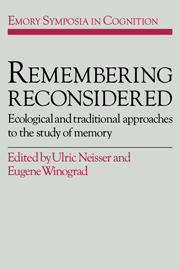Book contents
- Frontmatter
- Contents
- Preface
- List of contributors
- 1 New vistas in the study of memory
- 2 Continuities between ecological and laboratory approaches to memory
- 3 Memory for randomly sampled autobiographical events
- 4 Ordinary everyday memories: Some of the things of which selves are made
- 5 Walking in our own footsteps: Autobiographical memory and reconstruction
- 6 Memory observed and memory unobserved
- 7 The maintenance of marginal knowledge
- 8 The content and organization of autobiographical memories
- 9 The ontogeny of memory for real events
- 10 The functions of event memory: Some comments on Nelson and Barsalou
- 11 “The Wreck of the Old 97”: A real event remembered in song
- 12 Passive remembering
- 13 Remembering without experiencing: Memory for reported events
- 14 What is ordinary memory the memory of?
- 15 Go for the skill
- Name index
- Subject index
12 - Passive remembering
Published online by Cambridge University Press: 25 March 2010
- Frontmatter
- Contents
- Preface
- List of contributors
- 1 New vistas in the study of memory
- 2 Continuities between ecological and laboratory approaches to memory
- 3 Memory for randomly sampled autobiographical events
- 4 Ordinary everyday memories: Some of the things of which selves are made
- 5 Walking in our own footsteps: Autobiographical memory and reconstruction
- 6 Memory observed and memory unobserved
- 7 The maintenance of marginal knowledge
- 8 The content and organization of autobiographical memories
- 9 The ontogeny of memory for real events
- 10 The functions of event memory: Some comments on Nelson and Barsalou
- 11 “The Wreck of the Old 97”: A real event remembered in song
- 12 Passive remembering
- 13 Remembering without experiencing: Memory for reported events
- 14 What is ordinary memory the memory of?
- 15 Go for the skill
- Name index
- Subject index
Summary
I am particularly glad to join in a conference on ecological memory, and I am glad for at least two reasons. First of all, it lets me focus on the domain of passive remembering–the general experience of having things come to mind without their being requested. When we are under the spell of the past, captive to one or more past events; when we suffer from reminiscences, as did Freud's hysterical patients–in all these cases, we are engaged in passive remembering.
The second reason to be happy with an ecological approach is that it would seem the only way to study passive remembering. By definition, this type of recall can hardly be studied experimentally; the amount of data gathered per subject in the usual laboratory procedure is too small to be useful, and only by following a subject over a long period of time can we ever accumulate very much. Consider the findings from a typical setting for inducing unbidden thoughts, a sensory-deprivation experiment. Subjects tend to show enormous individual differences in the number of thoughts that come to mind under such conditions, and differ again in their willingness to report them. We are next faced with the difficulty of establishing the memorial validity of these thoughts–did the event really happen as remembered, and, if not, how was it changed? And finally, we have no way of comparing, within a given subject, the form and content of passive memories with the form and content of active memories, because an experiment designed to produce the former usually is all wrong for the latter.
- Type
- Chapter
- Information
- Remembering ReconsideredEcological and Traditional Approaches to the Study of Memory, pp. 311 - 325Publisher: Cambridge University PressPrint publication year: 1988
- 4
- Cited by



